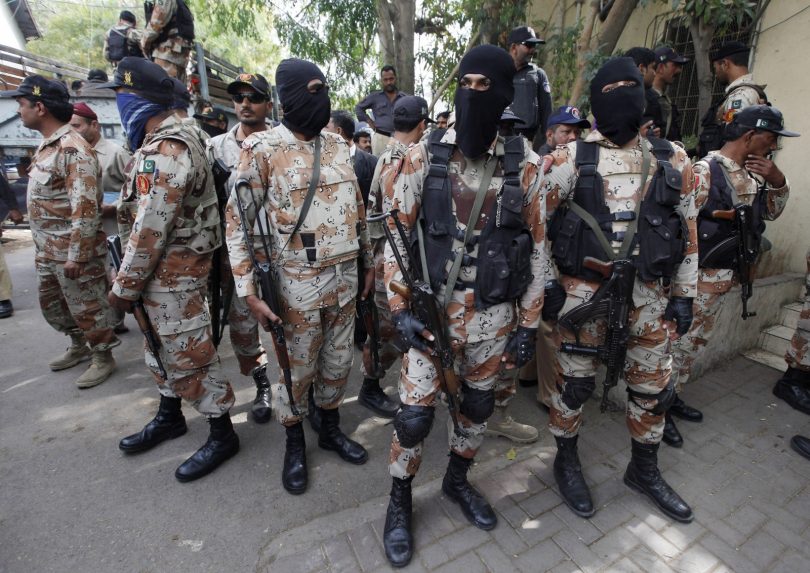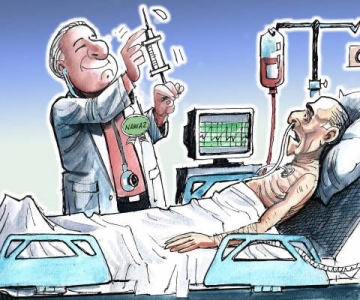The recent attacks on the Karachi naval base have once again sparked a debate concerning the much-feared radicalisation within the armed forces. Declan Walsh writing in The Guardian (May 23, 2011) says how the “spectre of Islamist infiltration has haunted the army for decades”. This should be a major concern for Pakistanis. At the same time, Pakistan’s defence forces are well-known for their internal discipline and the overarching ‘unity of command’ that all commanders take pride in.
Nevertheless, radicalisation in the junior ranks has been observed and reported by the national press. In particular, the attempts to kill the former president and army chief Gen Pervez Musharraf revealed the shifting ideological frontiers of the military complex. In June 2009, the Pakistan Air Force (PAF) confirmed that it had arrested or dismissed from service at least 57 employees in connection with botched attempts on the life of the former president. Abdul Islam Siddiqui, a soldier of the Pakistan Army was hanged in 2005 after an in-camera military trial for his alleged involvement in the December 2003 attack on Gen Musharraf`s convoy.
Siddiqui was charged with receiving terrorism training at Bhimber in Jammu & Kashmir (J&K) during August 2002 at a Jaish-e-Muhammad training camp. He further defied military orders to fight in South Waziristan against fellow tribal citizens. It was alleged he remained associated with the Shuhada Foundation, an organisation of the PAF, several of whose officer-bearers wanted to kill Musharraf (Outlook, October 19, 2005).
The plethora of cases relating soldiers influenced by Islamist ideology point to the reported gap between top army leadership and the soldiers. This gap increased as in the aftermath of the 9/11 terror attacks because of Musharraf’s half-hearted attempts to give the Army a liberal outlook.
Earlier, cases of disciplinary action against radicalised soldiers were also reported. In 2003, Major Adil Qudoos, brother of Ahmad Qudoos (who had given protection to Al Qaeda leader Sheikh Ahmad) was arrested in a surprise raid (Dawn, March 23, 2003). In 2005, a military court ordered the dismissal of six officers including Major Adil Qudoos (Daily Times, September 19, 2005).
Another recent case is illustrative: On December 10, 2009, one Col Bashir was arrested by the Pakistani military police along with Squadron Leader Nadeem Ahmad Shah, a retired air force fighter pilot and a former professional JAG lawyer and civilian advocate, and Awais Ali Khan, a civilian mechanical engineer who served with the military’s Air Weapons Complex. Col Bashir had contacts with the Hizbut Tahrir group (Dawn, May 13, 2009). In 2010, Faisal Shahzad was reportedly in touch with an officer of Pakistani Army’s Signal Corps, moments before he parked the bomb-laden SUV at the Times Square (pak-watch.blogspot.com, July 18, 2010).
Radicalised soldiers have also been reportedly creating informal networks. Arshad Sharif’s report in Dawn (14 Sept, 2010) revealed how a disgruntled junior non-commissioned officer formed Jundullah, a militant group with alleged contacts with Jaish-e-Muhammad. Impressed by calls to jihad, 30 other personnel from various army units stationed in Quetta Cantonment joined the new organisation. Some of these officers were also involved in planning botched attacks on Jacobabad Air Base in 2003, in addition to planning two separate assassination attempts on Gen Musharraf. In addition to PAF, Jundullah also tried to establish its influence within different units of the armed forces.
These cases are not confined to the last decade only. In 1995 there was a military attempt to overthrow the government in and ‘Islamic’ coup to reestablish the Caliphate. Maj Gen Zahirul Islam Abbasi, a former commander and officer of the Pakistani Army, was accused and convicted for a period of 7 years for being party to the coup d’etat. A total of 40 army officers, including one brigadier and five colonels and 10 civilians were rounded up.
New cables released by Wikileaks reveal how the “elites groups of colonels and brigadiers are receiving biased NDU [National Defence University] training with no chance to hear alternative views of the US”. Anti-Americanism within the armed forces is an oft-cited reality though one has no empirical basis to assess its impact and coverage within the institution.
All these reported cases demonstrate that there is a problem with middle and lower ranks. However, it is also clear that the top leadership within the armed forces is cognisant of such trends and has been taking strict action against the errant officials. In the wake of recent events such as the intelligence failure (some say cover-up) with respect to bin Laden’s hideout and now the attack on the naval base, the fault lines within Pakistan’s key institution need to be identified and tackled. Perhaps, it is also time for the command and control mechanisms instituted for nuclear installations to review the situation given how the world is viewing Pakistan’s nuclear assets as ‘unsafe’. These claims may be exaggerated but cannot be ignored.
Shahid Saeed and Saadia Gardezi contributed to the report
First published in The Friday Times, May 27, 2011 issue



